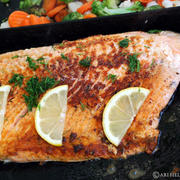 Protein is one of the body's most important building blocks. It plays a role in just about every type of cell and bodily function you can think of. A little extra protein in your diet after surgery can help prevent loss of muscle, and muscle loss delays healing. That's one of the reasons why protein is so vital to your recuperation.
Protein is one of the body's most important building blocks. It plays a role in just about every type of cell and bodily function you can think of. A little extra protein in your diet after surgery can help prevent loss of muscle, and muscle loss delays healing. That's one of the reasons why protein is so vital to your recuperation.
To maximize the amount of protein you get, here's a little trick: Until your appetite is back to normal, eat protein-rich foods first at each meal. Then, as your appetite allows, eat other healthy foods such as grains, vegetables and fruits. That way you won't fill up before you've gotten your protein fix. Also, you should have a high-protein food at each meal and 1-2 protein snacks between meals.
Healthy sources of protein include:
 Lean meats, such as chicken, turkey and fish
Lean meats, such as chicken, turkey and fish- Low-fat milk (soy milk has less protein than cow’s milk; almond or rice "milk" has no protein)
- Cheese, including cottage cheese
- Beans, such as black, baked, Lima, northern, kidney, garbanzo or chick peas, and black-eyed peas
- Tofu
- Eggs and egg substitutes
- Peanut and other nut butters, such as almond or cashew butter
- Nuts and seeds, including almonds, walnuts, pistachios, soy nuts, sunflower seeds
- "Veggie" burgers
- Meal replacement shakes, if your medical team identifies your need for additional sources of protein
The following foods have about the same amount of protein:
Food |
Amount |
Lean meats, fish, poultry |
1 oz., cooked |
Large egg (yolk & white) |
1 |
Milk, 1%, ½%, skim |
8 oz. |
2% or Reduced-fat cheeses |
1 oz. |
Low-fat yogurt |
8 oz. |
Low-fat cottage cheese |
¼ cup |
Beans (Black, kidney, lentils, lima, peas, chickpeas, garbanzo, black-eyed peas, baked, Edamame, etc.) |
½ cup, cooked |
Low-fat soy milk |
12 oz. |
High-protein cereals |
½ - ¾ cup |
High-protein drinks* |
4 oz. |
High-protein bars* |
½ bar |
*Be aware of the other nutritional & caloric values of these products!
An appropriate high-protein, breakfast or granola bar or drink for after surgery should have:
- No more than 250 calories
- At least 12 gm of protein
- No more than 10 gm of fat
Too much of a good thing?
Try to keep track of your protein intake during the day. It is possible to get too much of a good thing. Excess protein can fill you up so you're not as hungry for the other nutrients you need. Too much protein also can put a strain on your kidneys. You don't want to add any additional stress to your body while you're healing from surgery.
Learn more about:
- A Healthy Diet
- Nutrition Before Surgery
- About Weight Loss
- Nutrition After Surgery
Post-Surgery Nutrition Info
- Getting Enough Protein
- Upping Your Nutrition
- Healthy Snacks After Surgery
- High-Protein Smoothies
- About Weight Loss
